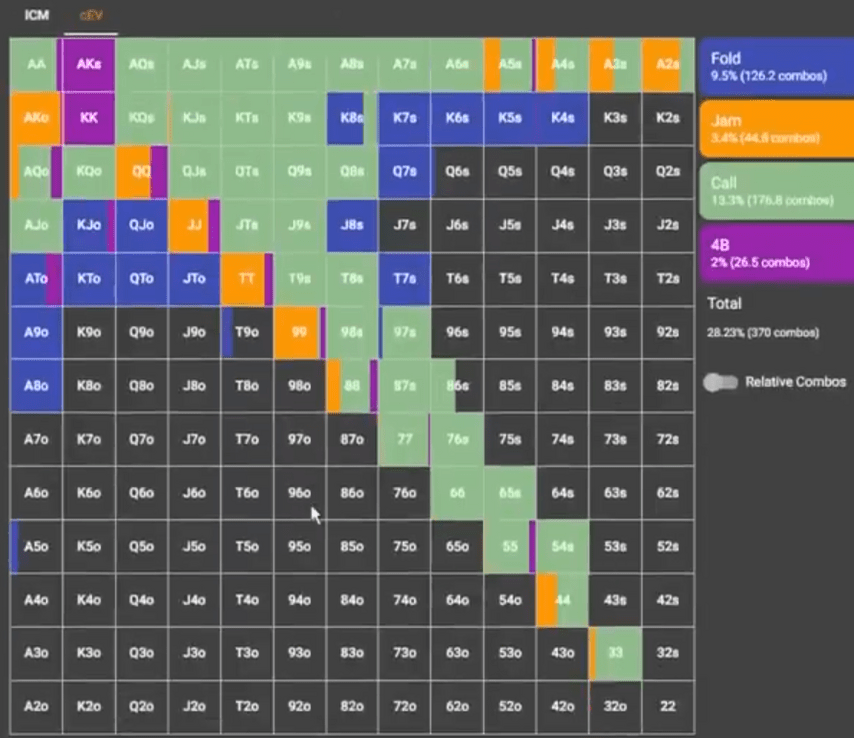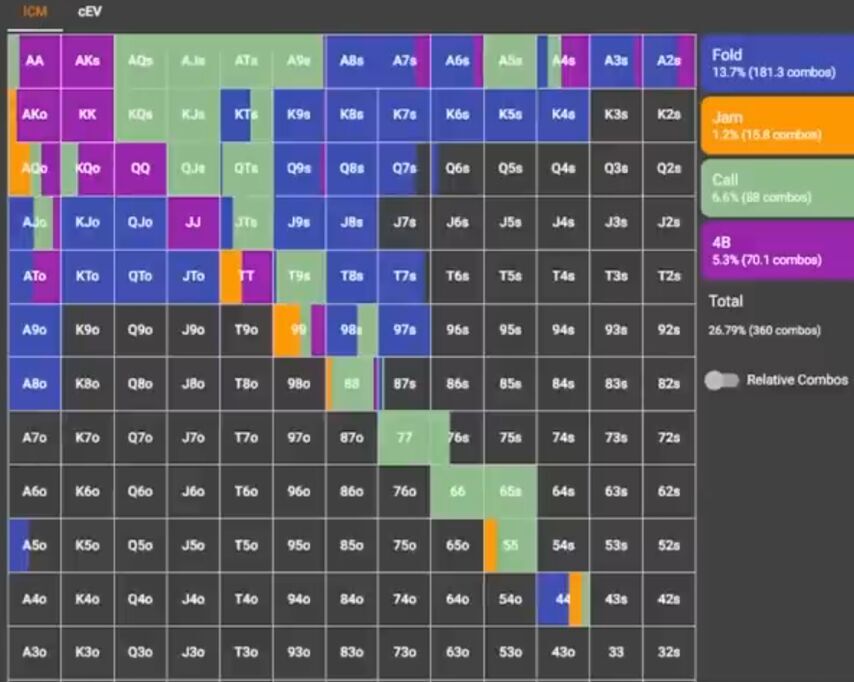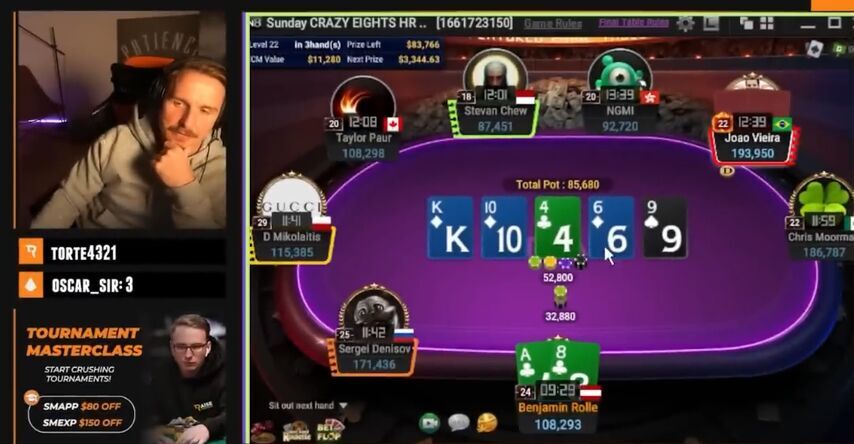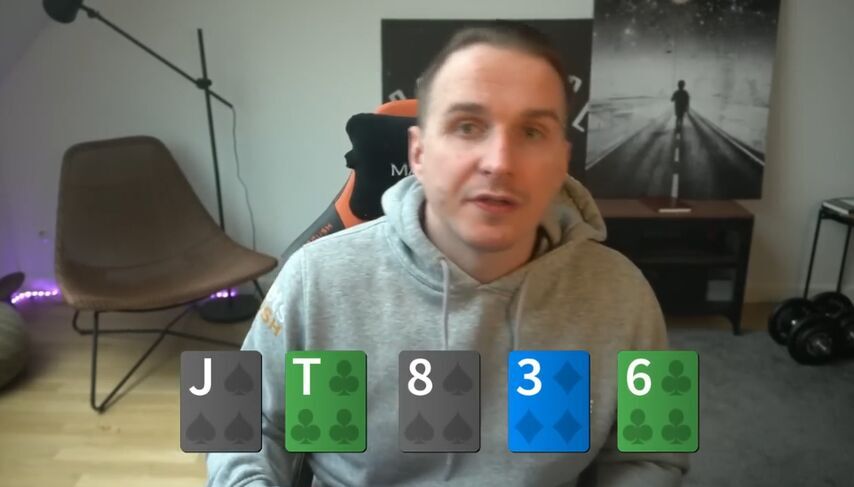Today I will tell you how to tear your opponents apart at low and medium limits of tournament poker in 2023. It doesn't take any extra work on the game to follow my advice – just do what I say and it will improve your win rate. They will help both beginners and experienced regulars, and even amateurs. If you love poker, but are too lazy to study theory, follow my advice and at least you will lose more slowly, which means you will be able to enjoy the game longer.
I still occasionally $11 play tournaments on stream and dream of winning the Sunday Storm someday, but I started with dollar SNGs. I know the game well at low stakes and of course, studied statistics with field trends.
Go!
Tip #1: Play a lot tighter than you think is right
Today we have a lot more data available to support this conclusion: the right play is often much tighter than we previously thought. It is clear that ranges based on chipEV have become completely irrelevant.
One of the typical situations, hijack vs cutoff, we raised and got 3bet 6bb. Here is our answer on chipEV:

And it's a good preflop chart... well, better than nothing. The problem is that it doesn't work in tournaments. Half of the field is still in the game, and the cash is still far away, but ICM is already significantly affecting our decisions. Want to know how to actually play?

Oops! See how many folds. How much tighter should we defend? Yes, without understanding the correct preflop in MTT today there is nothing to hope for.
Tip number 2: stability is more important than a long journey
Money in tournaments is earned by consistently hitting worthy cashes, and not by rare overall wins. "Playing for first" is a misconception that is still all too common among regulars. We all love to dream, there's nothing wrong with that, but dreaming shouldn't ruin our game. The right approach is solid, patient poker in the early to mid stages to get frequent cashes. If you think only about winning, it will only lead to additional stress in the later stages of tournaments, which will inevitably worsen your chances of success.
Tip #3: Become a fisherman
Listen, and don't say what you haven't heard! Playing poker is fun, but making money with poker is boring! You are waiting for convenient situations, waiting, waiting ... well, that's all, in fact. Like fishing. Real poker is not at all like what is shown on TV or on social networks. The glamorous high roller games with insane preflop, incredible calls, and crazy bluffs should inspire beginners, but there is nothing to learn from that. We will not make money at low and medium stakes at all. High rollers on the Internet have completely different lineups, the best of the best compete there, the top 1%, who know the theory perfectly, and for television shows, they often choose the most spectacular drawing options, which can generally be negative. If you want to make money playing poker at low limits, prepare yourself for the fact that you will be bored.
To win, you also need to control your emotions, avoid tilt, play as close to the A-game as possible, and execute a well-practiced solid strategy. It's like investing – an extremely rational occupation.
All in all, it's not that much fun to make money playing low-stakes poker. If you're looking for fun, want to play loose preflop, and pull some pretty bluffs, I won’t try to dissuade you. Have fun, but don't expect this kind of play to make you money.
Tip #4: Avoid big bluffs against amateurs and unknowns
Such plays are allowed against regulars whose game you know well.

Such bluffs should not be a priority when working on your game. There are many other areas that affect your overall win rate much more.
This rule has helped me a lot. Poker is a highly complex game, and any generalization that works 95% of the time is extremely valuable. I don't want to waste time on the 5% of situations where it's profitable for us to bluff against amateurs – too much work and too little benefit.
If you want to get an amateur to fold top pair, and bluff big but get called, you've made a mistake. You can call him an idiot for calling badly, but there is only one idiot in this situation – the one who wanted to get an amateur to fold top pair. Inexperienced players often make mistakes when estimating the relative strength of combinations, and you should take this into account in your strategy.
Of course, they don't respect your raises! They're here to have fun!
Tip #5: Don't be afraid to get greedy on the river
If you bet the flop and turn, and the board texture didn't change by the river, for example:

Or even like this – a more dynamic board, but the turn and river didn't change anything:

...your opponent is probably sitting with top pair, which is not going to fold. For such situations, I apply a simple rule: overbet for value! As a last resort, bet the pot. You don't need all those tricky sizings like thirds to induce a raise. To hell with such tricks! Your opponent has hardly heard that made hands can be turned into bluffs, he knows nothing about blockers. Stop holding yourself back, get as greedy as you can and your win rate will thank you. All-in! Vamos!
Now the second part of the same rule. You've made it to the river against an amateur but aren't completely sure of the strength of your hand. Maybe you have top pair with not the best kicker, for example. Maybe a check? Forget that! Bet 2/3 of the pot. Bet as much as your hand wants. Don't complicate it.
Tip #6: You don't need a hero call
If your opponent calls your bets twice and raises on the river, don't talk yourself into calling. Does the opponent show great strength? Fold, save the money. Everything is simple.
Tip #7: Forget about the GTO, completely!
Works not only against amateurs, in fact, but also against many regs. Get the GTO requirements out of your head and don't think about wanting to be balanced. Use the correct sizing. Do you remember the name of our game? NO LIMIT Hold'em. No restrictions. Fish min-raises from middle position when you have JTs in the CO? I would like to make a raise to play the pot one on one, to squeeze the strong players behind. Raise it up to 5bb! And if you have aces – up to 8bb or 10bb! Play a hand, not a range. Believe me, no one will notice this, no one cares. The pool at the low and mid stakes is huge and we are well-positioned for maximum flexibility in our sizing.
An amateur with T7s wants to see the flop, to find out if he will get a flush or not. Of course, an inappropriately huge 3-bet can convince him to fold, but this is clearly not the case with a 10bb sizing. Get the most value out of your strong hands.
The same applies to playing the flop. If I just want to defend my A-high or bluff cheaply with a weak hand, I c-bet a third of the pot. If the flop hits my hand, I bet big. I need to build the pot so that my opponent feels pot-committed by the river. “How can I fold when so much has already been invested?” For an amateur, this is difficult.
I want to bluff cheaply on the turn – I bet half the pot or 2/3. I have a set, want to get called by top pair? Pot bet! Easy!
Tip #8: Overfolding Against Nonbluff Lines
There are two lines that people under-bluff a lot. Overfolding against them will save you a lot of money.
1. Villain check-raised the flop and continued to bet big on the turn and river.
Just fold all hands that don't beat part of his value range. All bluff catchers fold, we don’t think about blockers, we don’t think about balance, and we forgot about the minimum defense frequency! He’s got it.
2. Very heavily under bluffed aggressive lines in 3-bet pots. This is three barrels from the aggressor, and a check-raise and bet turn, bet river from the caller. Fold like crazy. Let the overpair fly to the muck – the opponent has a set.
There is only one exception here: if you are playing against a maniac who has already shown that he greatly overestimates his hands. Such a person will bet any top pair. Then, of course, you don't need to overfold. But you must have reads. Against tight regs or unknowns, you can safely make very nitty folds. You don't have to pay for the obvious nuts. Start losing less than others in these situations and your win rate will go up.











